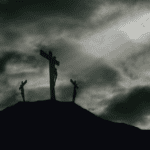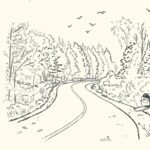Part of our annual My Year In… series
1. Uncanny Valley (Weiner)
This memoir of a woman who worked in IT in Silicon Valley resonated deeply with me. Parachurch ministry sometimes feels like a start-up, which is one reason for this, but I could also relate as a woman in tech with a humanities background. Memoirs are memoirs but this one had the kind of prose that got under my skin and conveyed the almost religious optimism and strange new social morality driven by technology, bitcoin, idealism, and shifting brand powers. Anna Weiner recounts conversations with tech-bros and entrepreneurs, coders who constantly mainline EDM music, the love-hate relationship she had with flexible work culture and, most importantly, the snacks. There’s an element of optimism in the early work-from-home movement which feels formative and relevant given its prevalence today.
2. Keeping Faith (Judd, Swinton, and Martin)
I’m a big fan of Kara Martin, she has an extraordinary practical grace and clarity about faith, work and ministry. Here she has collaborated with John Swinton and Stephen Judd to develop this lean, rich and practical manual with many case studies and examples. In my parachurch work, Keeping Faith: How Christian Organisations Can Stay True to the Way of Jesus has been beneficial for analysing our ministry and guidelines. It’s been instrumental in the design of new policies and procedures and reflection amongst our executive leadership. The illustrative case studies make the insights easy to apply and translate to different contexts. It’s a must for people in Christian ministry, particularly those in private or charity organisations whose staff are from different backgrounds and traditions of faith. It is a fast read you will not regret making time for.
Keeping Faith has been instrumental in the design of new policies and procedures and reflection amongst our executive leadership.
3. Brave New World (Huxley, adapted and illustrated by Fordham)
I tend to read a lot of secular titles through my Christian worldview so I was excited to discover this graphic novel adaption of one of my favourite novels of all time. I was familiar with Fred Fordham’s graphic novel adaption of To Kill a Mockingbird before discovering this title. I was struck anew that Brave New World could have been written for our times, and its exploration of pleasure, happiness, religion, sexuality, society, and truth is powerful and damning, yet again. Fordham’s illustrations are perfect and he manages to avoid gratuitous nudity or other adult content while portraying this novel faithfully. The key conversation between the ruler Mustafa Mond and his views on the Bible and Shakespeare blew me away.
4. Rosemary’s Baby (Levin)
In 2020 I listened to a summer book club podcast series “You’re Wrong About” with Sarah Marshall and Michael Hobbes. Their deep dive into Rosemary’s Baby triggered my fascination with the satanic panic. Even though I’m a researcher and librarian, finding a copy of this 1967 novel was extremely difficult—at last, my father found a copy on his shelf and posted it to me. Rosemary’s Baby is in some ways considered the smoking cultural gun that set off the satanic panic in the West. As expected, it’s brilliant, and unexpectedly, incredibly ironic and funny. I can’t handle supernatural themes in books or films, but I found myself re-reading macabre passages and laughing at its clear message of absurdity. Well worth seeing what all the fuss is about and where our secular world’s ideas about the devil may have originated.
5. Biblical Critical Theory (Watkin)
I almost didn’t include this title in my list as I’ve received enough flack for praising this book far too much. I taught small classes in critical theory, ethnography and other methods at university level and was frustrated that “critical theory” seemed to have become a term that triggered great anxiety in Christians about secularisation. This book is not only one that uses critical theory as a method but appropriately uses the Bible as its hermeneutic to analyse culture. Watkin shows us that it’s not the methodology that’s the problem, it’s the way you use it. A critical theory is using a text to analyse and interpret problems in society, and then suggesting potential ways forward. The Bible is, of course, more than a critical theory, but it is also the very best critical theory there is. Watkin’s book will be important for Christian scholarship for decades. It doesn’t hurt that his tone is wry, friendly, conversational, and meticulous. It’s a book I could easily give to people of all faiths (and none) because of his careful attention to tone and his posture of respectful engagement.















